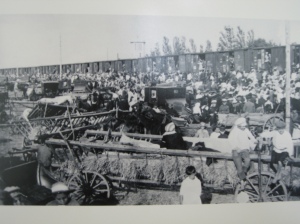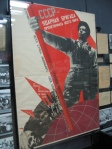Tags
Communists, Family Stories, gnadenfeld, Historical fiction, history, mennonite, molotchna, short stories, Soviet, Stalin, stories
At the end of the Revolution, around 1922, large groups of Mennonites left the colony for Canada and Mexico, but most of the folks in Gnadenfeld had stayed, optimistic that a better future was ahead. “They were wrong”, Isaak thought.
Years ago, during one unusually long game of dominos, the older men mentioned that initially after the Civil War, life on the farms temporarily began to be bearable. Some private trade started up, requisition of grain stopped, selling produce on the free market was possible and a certain amount of religious freedom existed. That lasted a precious few years until 1927 when the government, lead by Joseph Stalin, declared that all farms were to be united under the State to create great collective farms. Any farmer that resisted, and many did, was forcefully removed from their land and homes and sent away, never being seen or heard from again. All property was confiscated from those who fought, the families loaded into boxcars and under the most crude conditions taken to slave labor camps in the north or to the mines in Siberia. Those who did not resist were able to stay in their homes with their families but the land was no longer theirs; it belonged to the State.
One year later, the forced collectivization became more aggressive. If someone in the colony had machinery, farm buildings, live-stock or hired labor for longer than 75 days of the year, or just resisted the changes in any way, he was labeled a “Kulak,” a person who “exploited people.” Renewed attacks on religion and education began, and teachers were forced to sign documents promising not to teach religion, the core of their education system. Many Mennonites had to give up teaching because of conscience or tried to teach nonpolitical and nonreligious subjects. From then on, the classroom curriculum was built by the State. The Mennonites had no say in what was presented in the classroom. Isaak was forced to send his oldest daughter to the State school and his son would have to start attending soon. Nothing good could come from such an education!


